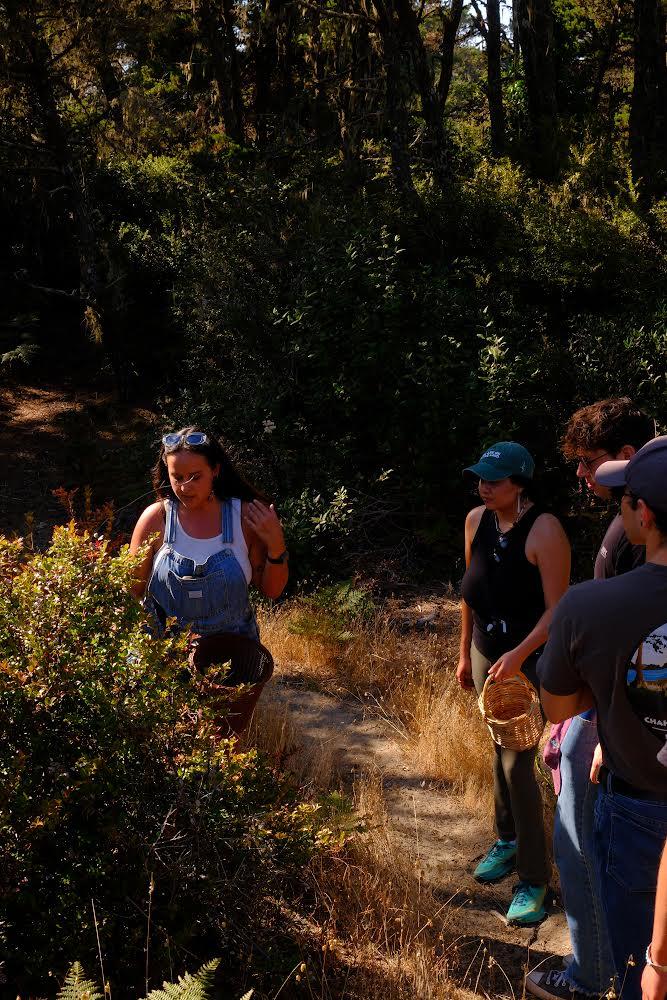Specialty Crop Initiative

Last fall, the Rou Dalagurr Food Sovereignty Lab and TEK Institute, attended the annual Intertribal Agriculture Council Pacific Region conference. At this conference, lab staff Marlene’, Cassandra, and Delaney presented on the work being done at the lab. Following this presentation, staff were approached by a representative of the USDA Specialty Crop Block Grant Program to express their interest in the work being done at the lab and let us know they thought we were a good fit as an applicant for the grant. With just 2 weeks to the deadline, we applied through the USDA Specialty Crop Block Grant to start on a new project. After a year of edits and evaluations, we were notified that we were awarded this grant! The lab will be embarking on an innovative project called the “Food Sovereignty Lab Specialty Crop Initiative” starting November 2024. This project is aimed at strengthening traditional food practices and enhancing food sovereignty within our local Tribal communities. This initiative is designed to address the significant issues of food insecurity and lack of access to culturally relevant foods for our Tribal communities in Humboldt and Del Norte counties.
The initiative will be lead by lab staff Cassandra May who will server as the program manager and she will facilitate hands-on engagement with Tribal partners in the Hoopa Valley and Klamath River communities.. FSL will work closely with local specialty crop producers, Tribes, and Tribal organizations to develop and implement a series of educational workshops and training sessions. These sessions will center on culturally significant specialty crops, equipping participants with practical skills and knowledge essential for successful cultivation practices. This project will run from November 2024 to June 2027.
A key highlight of the initiative is the support for the continuation of the Indigenous Food Festival (IFF), which is a month-long event highlighting and celebrating Indigenous food producers and cultural practices. This festival not only features educational workshops but also provides a platform for the Native community to connect with new market opportunities. Historically, the IFF has attracted over 500 participants, and through this project, we aim to expand its reach and impact. The festival will continue to serve as a focal point for community engagement, featuring presentations, food sampling, and informational booths that promote Indigenous food sovereignty. With the help of this project, reports will be printed following the Indigenous Foods Festival. These reports will include the information gathered from data collection at the event as well as data surrounding the outcome of the workshops and festival itself. The information in the report from the festival will include education provided from; presentations, workshops, food sampling, and informational booths from Tribal food producers and Tribal food sovereignty organizations that took place at the festival. These reports will be distributed amongst our local Tribal communities from the lab as well as through local tribes themselves and local Tribal Food Sovereignty programs.
This initiative will provide ongoing technical assistance to Hoopa Kin Tah Te Tribal Garden, the Yurok Klamath Food Village and Weitchpec Food Village, and Tribal specialty crop producers and community members in the region. This will include conducting needs assessments to tailor support effectively, developing educational curricula, and publishing resources that highlight best practices for sustainable agriculture based on Traditional Ecological Knowledges. One of the resources planned to be published is specialty crop educational curriculum reports. These reports will include the educational information provided from workshops, training, and curriculum developed for Tribal partners sites such as; specialty crops fit for producing in the local geographical area, information on how these identified specialty crops can be grown, information on various local resources the producers can connect with to pursue the process of selling the specialty crops. This will insure the information is able to be utilized and distributed by our Tribal partners both during and beyond the life of the project. The goal is to empower Tribal farmers, gardeners, producers, and community members to continue to strengthen cultural practices in conjunction with fostering resilience in our food systems.
The Food Sovereignty Lab Specialty Crop Initiative represents a comprehensive effort to support our Tribal communities in the continuance of traditional food practices, promote environmental sustainability, and empower the next generation of Tribal farmers, gardeners, producers, and community members. At it’s core this project aims to create a lasting impact on food security and cultural preservation within the region.
